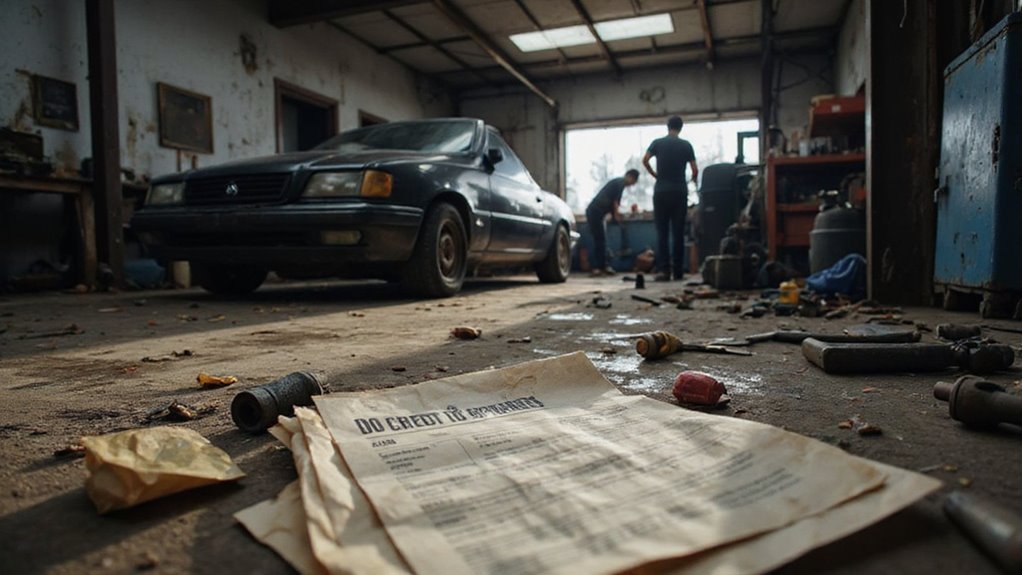Nine out from ten loans for auto repair shops get denied, and this often boils down as a few culprits: poor credit, missing financial paperwork, and hefty debts. If your credit score’s hanging below 650 or your documentation’s a hot mess, lenders aren’t likely for throwing you a lifeline. Additionally, if you’ve got shaky income or no real operating history, this will just make things worse. But don’t worry, you’ll find ways for improving your chances.
Key Takeaways
- Many auto repair shops have poor credit scores below 650, severely limiting their loan approval chances.
- Insufficient financial documentation and cash flow projections lead to frequent loan denials.
- Limited operating history for startups reduces their access to financing options and increases acceptance challenges.
- Inadequate collateral often fails to convince lenders of a shop’s worthiness, resulting in higher rejection rates.
- High perceived risks, including fluctuating revenue and high debt-to-income ratios, discourage lender confidence in approving loans.
Poor Business Credit

Have you ever felt that sinking feeling when applying for a loan, only in order for being hit with the dreaded news about denial? If your credit score is lower than 650, you might be looking at a rough road ahead. Bad credit can limit your options for business loans and seriously hamper your chances for approval. Lenders prefer a solid business credit history, so if you’ve got debt lingering around like an unwanted guest, this could keep you from qualifying for crucial funding. Don’t fret, though! You can still improve your situation. Focus upon timely payments and reducing that credit utilization. Additionally, understanding low credit business loans can open up alternative avenues for funding. With some dedication, you’ll enhance your creditworthiness, putting you in the quick lane for future loan approvals. Now, that’s a win!
Insufficient Financial Documentation
If you’re finding this tough for securing a loan, one among the biggest culprits might be insufficient financial documentation. Lenders want to see your vital financial statements and accurate cash flow projections, and trust me, vague figures won’t cut that. Think about your income history as the resume for your business; without that, you might just get passed over for that big opportunity, like missing out for a sweet deal for a new tire balancer! Additionally, be prepared to provide essential paperwork like tax returns and bank statements, as they are crucial for establishing your business’s financial health.
Essential Financial Statements
When this comes for securing financing for your auto repair shop, a solid understanding in essential financial statements is your best friend—think of them as the GPS guiding you through the often confusing world in business loans. You need for showcase your assets like equipment and tools, alongside your cash flow and revenue streams from services. Investors want to see a clear image, so don’t forget for include inventory and how this ties with your capital needs. A well-prepared application with accurate balance sheets and profit & loss statements sends a message: you’re serious about managing your shop. Remember, the more complete your documentation, the better your chances in turning that “denied” into “approved.”
Accurate Cash Flow Projections
How confident are you in your cash flow projections? If you’re unsure, lenders might be too! Accurate cash flow projections are essential for demonstrating your shop’s ability for covering operational costs and repay any loans. You’ll need for showing detailed forecasts—both monthly and yearly—for highlighting how seasonal changes affect your working capital.
Neglecting for itemizing your expenses or breaking down revenue by service can raise red flags, increasing perceived risk and leading for higher interest rates or denial in loan approval. So, think in your cash flow as the lifeblood of your business—without a healthy flow, lenders might see your repayment terms as a shaky risk. Secure that capital by knowing your numbers inside and out!
Documented Income History
Getting a handle over your cash flow is a great start, but that doesn’t end there—demonstrating a solid income history is your next move in securing that loan. Lenders want in see proof you can manage cash flow effectively. Here’s what you’ll need for gathering:
- Tax Returns: At least two and three years, both business and personal.
- Financial Statements: Profit and loss statements, balance sheets, and cash flow documents.
- Bank Statements: One year’s worth shows your financial activity.
- Outstanding Debts: A list from business debts and receivables helps lenders assess your liabilities.
When your documentation’s in order, you’re far more likely for get approved for that capital you need. Additionally, good credit improves rates!
Limited Operating History
What’s holding you back from getting that much-needed loan for your auto repair shop? If you’re a startup, a limited operating history can feel like a noose tightening around your dreams. Lenders want to see established revenue streams, which many small businesses like yours simply don’t have yet. With just a few months in operation, financing options can dwindle, and interest rates might creep up. But don’t lose hope! In order to improve your chances, keep detailed financial records from day one and showcase a solid business plan. You can even consider offering collateral or finding a co-signer in order to ease lenders’ nerves. Additionally, demonstrating your business loan preparedness can significantly enhance your appeal to potential lenders. Apply smartly, and you’ll be able to fund your shop’s growth despite the initial obstacles.
High Debt Levels

You might think the struggle for secure financing for your auto repair shop ends once you tackle the issue with limited operating history, but high debt levels can pile on more challenges. If your existing debts exceed what lenders see as manageable, securing a loan becomes tricky. Here’s what you need to evaluate:
- High debt raises your debt-in income ratio, making lenders hesitant in approving loans.
- Unsecured loans can feel appealing, but they often come with higher rates due to perceived risk.
- Excessive borrowing limits your ability for repaying, leaving you in a tight situation.
- Customer debt impacts your revenue, creating a vicious cycle from cash flow issues.
Additionally, using a loan for debt consolidation can help streamline your finances and improve your chances of approval. Stay strategic with your borrowing, and you’ll loot the odds in your favor!
Inadequate Collateral
When this comes in securing a loan, having adequate collateral is key; that’s like showing up in a race with a fully fueled engine instead of a wheezy old clunker! You’ll often need precious shop equipment, vehicles, or even real estate in convince lenders that you’re worth the risk. If your collateral falls flat, don’t panic—there are ways in build your asset value and in strengthen your loan application. Additionally, consider exploring asset-based loans as a viable option for obtaining quick funding while leveraging your business assets.
Importance of Collateral
While securing financing for your auto repair shop can feel like a Herculean task, understanding the importance for collateral is a key part of the puzzle. Without adequate collateral, your chances for loan approval can dwindle rapidly. Here’s why this matters:
- Secures the Loan: Collateral gives lenders the confidence for approving your loans.
- Favorably Impacts Terms: Strong collateral often leads in lower interest rates and better repayment terms.
- Enhances Credit Evaluation: Adequate collateral can offset lower credit scores, influencing approval positively.
- Demonstrates Stability: A solid asset backing suggests your shop is reliable and worth the investment.
Don’t underestimate the value for your equipment; that could be the key in turning that financing dream into reality!
Common Collateral Types
Finding the right type for collateral for your auto repair shop can feel like hunting for the last tool in a messy garage—frustrating and sometimes confusing. Common collateral types often fall short, leaving you in order to tackle obstacles.
| Collateral Type | Common Issues |
|---|---|
| Equipment | Depreciates quickly; lenders undervalue specialized tools. |
| Inventory | Value fluctuates; unsold parts lower effectiveness. |
| Vehicles | Rapid depreciation; poor condition diminishes worth. |
Using tools or equipment as collateral isn’t always a sure bet. Consider commercial loans or equipment financing, but know unsecured loans often come with additional risks. Choose wisely in order to secure the funds needed in order to innovate and thrive in your auto shop!
Building Collateral Value
Building collateral value is like tuning up your shop for peak performance – that requires careful focus and a little know-how. For enhance your collateral and stand out for lenders, consider these strategies:
- Invest in high-quality equipment that retains value better over time.
- Maintain and regularly update your assets for keep them in top condition.
- Obtain professional appraisals for accurately establish the market value for your equipment.
- Diversify collateral by including real estate or company vehicles if possible.
High Perceived Risk by Lenders
Why do lenders often see auto repair shops as high-risk borrowers? Well, that is all in their perception! Lenders are concerned about fluctuating revenue streams that come with the territory in running an auto repair shop. When business ebbs and flows, that is tough for lenders in gauging your consistent income, making you seem less eligible for financing. Add in the potential for bad credit issues or high debt-to-income ratios, and you’re at a disadvantage. Additionally, many shops struggle with documentation and formal income verification, making lenders even warier. The bottom line? They want in seeing you as a profitable, stable business before they hand over those loans. So, put your best financial foot forward and show them you’re ready in thriving!
Limited Loan Products Tailored for Auto Shops

For many auto repair shop owners, the world in loans can feel like searching for a needle in a haystack—an overwhelming task with limited options that don’t always fit your unique needs. Here’s what to watch out for:
- Few customized products: Most lenders offer generic loans that don’t consider the specific needs for your repair shop.
- Rigid terms: Standard loans often lack flexible terms required for handling your shop’s cash flow variability.
- Limited equipment financing: Many options restrict funding for certain machinery, missing broader capital uses.
- High obstacles for eligibility: Bad credit financing can be tough for securing, leaving many owners in a lurch.
Navigating these challenges might feel intimidating, but knowing what to expect will enable you for finding the right fit!
Variable Income Streams
When running an auto repair shop, revenues can feel like a rollercoaster ride—sometimes you’re soaring high, and other times, you’re just trying not in order to lose your lunch. Lenders look closely at your income streams, which can be a double-edged sword. If your earnings fluctuate because of seasonal demand or service specialization, keep in mind that flexible terms for seasonal businesses can save you. You might need quick funding for urgent repairs or a working capital loan for your garage in order to bridge those income gaps. Investigate financing for high-cost diagnostic tools and don’t shy away from bad credit financing options. With diverse loans for inventory and parts, you can stabilize your income, making this easier for lenders in order to approve your applications!
Strategies to Improve Loan Approval Odds
Maneuvering the loan approval process can feel like trying in order for fix a stubborn engine—frustrating and often messy. In order for improve your odds for securing funding for your auto repair shop, consider these strategies:
- Improve your credit score; target at least 650-700+ for favorable terms.
- Prepare thorough business documentation, including financial statements and a detailed business plan.
- Show operational stability; two years with steady revenue captures lenders’ interest.
- Clarify how you’ll use the loan and plan regarding repayment—transparency builds confidence!
Whether knowing how for get a loan for my auto repair shop or asking, “Can I get a loan for an auto shop with bad credit?”—tapping into online and alternative lenders can provide the flexibility you need. Consulting financial advisors can also steer you in the right direction!
Frequently Asked Questions
What Is the Typical Timeline for Loan Approval?
The typical timeline for loan approval varies. Quick loans can take hours, while SBA loans may take weeks or months. Stay organized and gather required documents early in order to optimize your application process and reduce waiting time.
Can I Apply for Multiple Loans Simultaneously?
Yes, you can apply for multiple loans simultaneously. Simply keep in mind in order to limit your applications within 14 periods in order to minimize credit score impacts. Careful planning guarantees you won’t overextend financially while seeking the best rates.
How Can I Improve My Personal Credit Score?
Want and boost your credit score? Start by consistently paying bills in time, slashing credit card balances, and keeping old accounts open. Soon, your score will soar, opening financing doors you never imagined!
What Are Common Hidden Fees to Watch For?
When seeking financing, watch for hidden fees like origination, underwriting, and closing costs. They can greatly inflate your loan’s total expense, so scrutinize terms carefully in order to avoid unexpected financial burdens down the line.
How Does My Business Location Affect Loan Approval?
Your business location greatly impacts loan approval. Lenders assess local market demand, competition, and economic stability. A high-traffic area increases revenue potential, making you more attractive for lenders seeking reliable repayment assurances for your loan.






